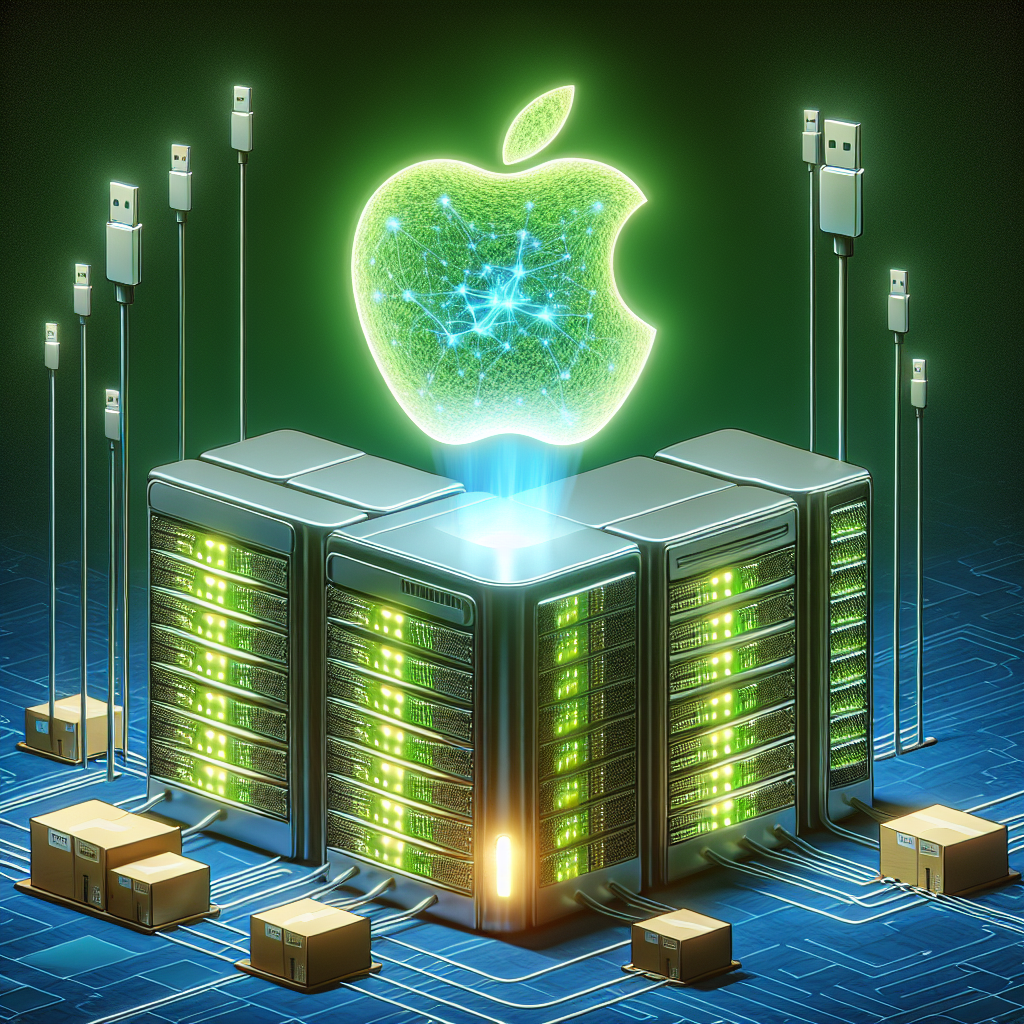Apple Invests $1 Billion in Nvidia Servers for AI Growth
Apple’s Strategic Shift in AI Infrastructure
Apple has consistently led the way in AI advancements, embedding machine learning and artificial intelligence within its ecosystem. Recent developments indicate that the tech powerhouse is making a significant move by investing $1 billion in Nvidia servers to bolster its AI functionalities. This raises inquiries regarding Apple’s AI strategy, especially considering its earlier commitment to using Apple Silicon for AI processing.
Transitioning from Apple Silicon to Nvidia for AI
Earlier in 2024, Apple attracted attention by announcing its intention to depend on its own Apple Silicon processors to power its AI servers. By June, the company reinforced this commitment, declaring that its data centers would center around Apple Silicon chips. This strategy was framed as a means to preserve privacy and security—two cornerstones of Apple’s identity.
However, recent reports reveal that Apple is acquiring 250 Nvidia NVL72 servers, each priced between $3.7 million and $4 million. This indicates that Apple is extending its AI capabilities beyond what its in-house silicon can presently provide.
What Sets Nvidia’s NVL72 Servers Apart?
The Nvidia NVL72 server is a formidable asset for AI development, boasting:
- 36 Grace CPUs
- 72 Blackwell GPUs
These features make the NVL72 a premium system specifically designed for generative AI and large language models (LLMs). While Nvidia has noted that these servers won’t be released until March 18, 2025, Apple could be placing pre-orders to ensure early access.
Implications for Apple’s AI Direction
Apple’s acquisition of Nvidia servers indicates that the company is investing significantly in generative AI—a sector populated by models like OpenAI’s ChatGPT and Google’s Gemini. This brings forth several important considerations:
1. Privacy vs. Performance
Apple’s Craig Federighi previously asserted that Apple Silicon servers were vital for guaranteeing privacy in AI processing. If Apple is now integrating Nvidia hardware, how will it uphold its rigorous privacy standards?
2. Development vs. Deployment
It’s possible that Apple is procuring these servers solely for development purposes rather than end-user applications. If that’s the case, Apple may continue to utilize Apple Silicon for consumer-facing AI interactions while leveraging Nvidia servers for research and model refinement.
3. Competition with AI Giants
By investing in Nvidia-powered AI, Apple is positioning itself for more vigorous competition with industry leaders like Microsoft, Google, and Meta, all of which have made substantial commitments to AI infrastructure.
Super Micro Computer & Dell as Key Collaborators
The report also notes that Super Micro Computer and Dell are Apple’s primary server collaborators for this initiative. Both firms are renowned for their proficiency in high-performance computing (HPC) and AI data centers, making them sensible partners in Apple’s AI expansion.
Future Prospects for Apple AI
Apple’s investment in Nvidia servers could indicate a shift towards more robust AI applications, potentially strengthening Siri, on-device AI features, and cloud-based AI services. This could lead to progress in:
- AI-enhanced personal assistants
- Refined computational photography
- Better natural language processing
- More sophisticated predictive analytics
However, this transition also prompts questions about whether Apple will maintain its focus on privacy while incorporating third-party AI hardware into its ecosystem.
Conclusion
Apple’s $1 billion commitment to Nvidia servers represents a crucial development in the company’s AI strategy. While Apple has publicly promised to use Apple Silicon for its AI processing, this action hints that the company is willing to utilize external hardware to remain competitive in the AI landscape. Whether this expansion will result in new AI-driven Apple products or simply enhance backend AI development remains uncertain.
Q&A: Key Insights about Apple’s AI Expansion
1. Why is Apple investing in Nvidia servers if it has Apple Silicon?
Apple Silicon is optimized for on-device AI processing, but Nvidia’s NVL72 servers offer greater power for generative AI and large-scale AI training, which Apple might require for development endeavors.
2. Does this indicate that Apple is moving away from privacy-centric AI?
Not necessarily. Apple may continue to employ Apple Silicon for consumer-oriented AI while utilizing Nvidia hardware for research and development efforts.
3. What applications are Nvidia NVL72 servers intended for?
These servers are tailored for AI model training, large language models (LLMs), and high-performance computing, making them suitable for generative AI tasks.
4. Will this affect Apple’s AI products, such as Siri?
Possibly. If Apple employs Nvidia servers for AI training, we might witness a more intelligent, responsive Siri and other AI-enhanced Apple functionalities.
5. When will these Nvidia servers be available?
Nvidia has announced that the NVL72 servers will be available starting March 18, 2025, implying that Apple’s AI expansion may take time to materialize.
6. Who are Apple’s partners in this AI investment?
Apple is reportedly collaborating with Super Micro Computer and Dell, both of which specialize in high-performance AI infrastructure.
7. What does this mean for Apple’s rivalry with Google and Microsoft?
This initiative positions Apple to compete more effectively with Google’s Gemini AI, Microsoft’s AI projects, and other tech giants heavily investing in AI-driven cloud solutions.